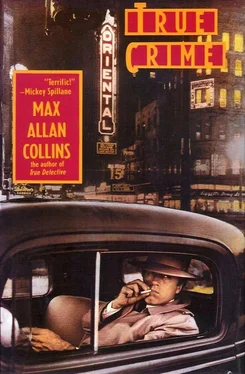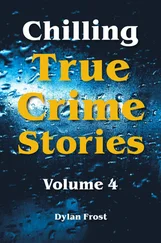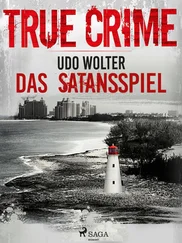“That does have me stumped,” I admitted. “But I noticed the prints didn’t get entered as evidence at the inquest. Some agent just testified they matched up, right? So who took em?”
“Uh, took what?” Purvis said.
“The prints, man! Which of your men took the prints?”
Purvis and Cowley exchanged looks; I couldn’t read the meaning.
Cowley said, “It was done by some Chicago police officer, at the morgue last night.”
“Chicago police officer?”
“Yes.”
“You mean, East Chicago?”
“No. Chicago.”
“Do you know the cop’s name?”
Both men shrugged.
“Let me get this straight — there’s been absolutely no Chicago police involvement in the case whatsoever up till this point, then suddenly it’s not one of your men, but a Chicago cop who takes the prints. A nameless Chicago cop, at that.”
This time only Cowley shrugged. “It was at the Cook County Morgue. What can I say?”
“Why don’t you go down and take another set of prints while you still can?”
“What for?” Purvis said, irritably.
Cowley shook his head. “I think it’s too late. I think Dillinger’s father has come from Indiana for the body. They’re supposed to’ve shut down that show at the morgue by now, and turned Dillinger over to—”
“Well, hell, go to Indiana, then. Catch up with Dillinger Senior before the burial. Save yourself exhumation expense. Check the prints.”
“Why bother?” Purvis said.
“Why bother? Because as somebody said — I think it was you, a couple of hundred times — the Chicago cops would sell their grandmother out for a cigar. Or words to that effect.”
Purvis looked at his watch. Then, suddenly civil again, he said, “I have to stop back at my apartment for my luggage, before I get that train. I’ll have to leave you gentlemen, now.” He walked to the door, turned and said, “See you in a few days, Sam. Mr. Heller, thanks for sharing your theories with us. Interesting if farfetched, but we do appreciate that you’re otherwise keeping them to yourself. Good evening.”
“Oh, Melvin,” I said.
He stopped momentarily, the door open.
I said, “You may catch your train, but you are definitely missing the boat.”
He snorted and went out.
Cowley and I just sat there awhile.
Then I asked, “Where’s he off to?”
“Washington, D.C.,” he said, quietly.
“Going to shake his boss’s hand, I take it.”
“Yes. He’ll be meeting with the director, and the attorney general as well.”
“Lots of publicity shots, I suppose.”
Cowley shrugged, then nodded.
I said, “Melvin Purvis is building a big reputation on this dead man’s back. I wonder how Little Mel’s going to sleep, over the next twenty or thirty years, knowing the man he’s supposed to have killed might turn up, any minute?”
Cowley said nothing.
I got up. “I wish you guys luck. At least I wish you luck, Cowley. You seem decent enough.”
He stood, shook my hand. “You’re all right yourself, Heller. I don’t really think there’s anything much to what you’ve said here today...” He didn’t sound quite convinced of that. “...but I do appreciate that you, out of some sense of civic duty or honor or whatever, chose to come to us with this.”
I laughed. “That’s a new one. I never had civic duty or honor laid on me before. By the way, I got a piece of that reward money coming, don’t I?”
Cowley seemed surprised by that. He said, “I would assume so.”
“Well, if this sweater don’t come unraveled in the next few days, and that stiff manages to get planted under a gravestone that says Dillinger, you know where to send the check.”
He nodded.
The check came in a few weeks. Five hundred dollars was all I got. Word was Anna Sage got five grand, though some said ten. Zarkovich got around five gees, too, word was. That’s what the government paid ‘em. Who knows how much they got from John Dillinger. And/or Nitti.
What followed, in the aftermath of the Biograph shooting, I viewed from the sidelines, reading the papers, listening to the radio, and hearing small talk in bars and such.
During the next day or so, more morbids thronged the small funeral home in Mooresville, Indiana, Dillinger’s hometown. The papers reported another five thousand people (one for every dollar the feds paid Anna Sage) viewed the corpse, laid out on a brocade spread in the visitation parlor. The papers reported that most of the people who had known Johnnie over the years had “difficulty” recognizing him, he’d changed so. This included the corpse’s sister Audrey, who’d all but raised him; she never did identify the body exactly — she only said, “There’s no question in my mind — just bury him.”
When Dillinger’s father had come to Chicago to pick up his son’s remains, the early interviews had the father bemoaning the lack of funds for burial; but by late the same afternoon, after a meeting with attorney Louis Piquett, a more cheerful elder Dillinger said it turned out there was money enough after all. Maybe he found somebody’s wallet on LaSalle Street.
Among the other interesting events of the days that followed was Anna Sage coming out in the open, for newspaper interviews and such, basking in her “lady in red” celebrity. Early stories circulated by Purvis and Cowley — complete falsehoods designed to shield Anna and Polly — were soon forgotten, and Anna held court with the press — until Cowley and Purvis sent her on a paid vacation.
A discovery the Chicago police made, at Anna’s apartment in the early days, was that somebody had been staying with her, rooming with her — a man. According to the papers, the cops believed Dillinger to have been that man. Nothing ever came out, though, as to what might or might not have been found in the fancy apartment near the lake, on Pine Grove Avenue.
On the Friday after the Biograph shooting, one James Probasco (the papers said) fell nineteen stories from a window in the Banker’s Building to the alley below; he splattered headfirst, getting some of himself on a passing pedestrian. He had fallen from that same interrogation room where Purvis and Cowley and I talked; he’d been left alone there, by Cowley and some other agents who’d been questioning him (Purvis was still picking up accolades in Washington at the time), and jumped to his death, reportedly. Cowley said the man had seemed “despondent”; nobody in the building across the way, the Rookery, saw the man leap. One of the reasons for Probasco’s despondency, besides a fear of his underworld associates thinking he may have “talked,” was a nerve infection called herpes, for which he was under medication.
Probasco, whom I’d heard of but never met, was said to be a “hot-money” fence, and his connections to both the mob and the likes of Dillinger were well known. He even had some political connections, being related by marriage to an old Cermak crony, former alderman Thomas J. Bowler, currently president of the Sanitary district.
A man in his mid-sixties who’d be facing at most a year or so in jail on harboring a fugitive and conspiracy charges, Probasco seemed an unlikely candidate for suicide. Something that didn’t get much coverage in the papers was the word among cops and crooks in town that the feds regularly hung suspects out the windows by the feet to try to make ’em talk. In Probasco’s case, they were probably trying to make him comply with the face-lift story they were trying to make float.
Probasco, a former veterinarian, apparently had, in addition to his fencing activities, been running a face-lift shop for some time — the feds found rubber gloves, ether, bandages, adhesive tape, iodine and guns in his apartment. He was, they said, part of a conspiracy that included Piquett’s personal investigator and two other doctors and Piquett himself, in giving Dillinger (and his pal Homer Van Meter) face-lifts.
Читать дальше












